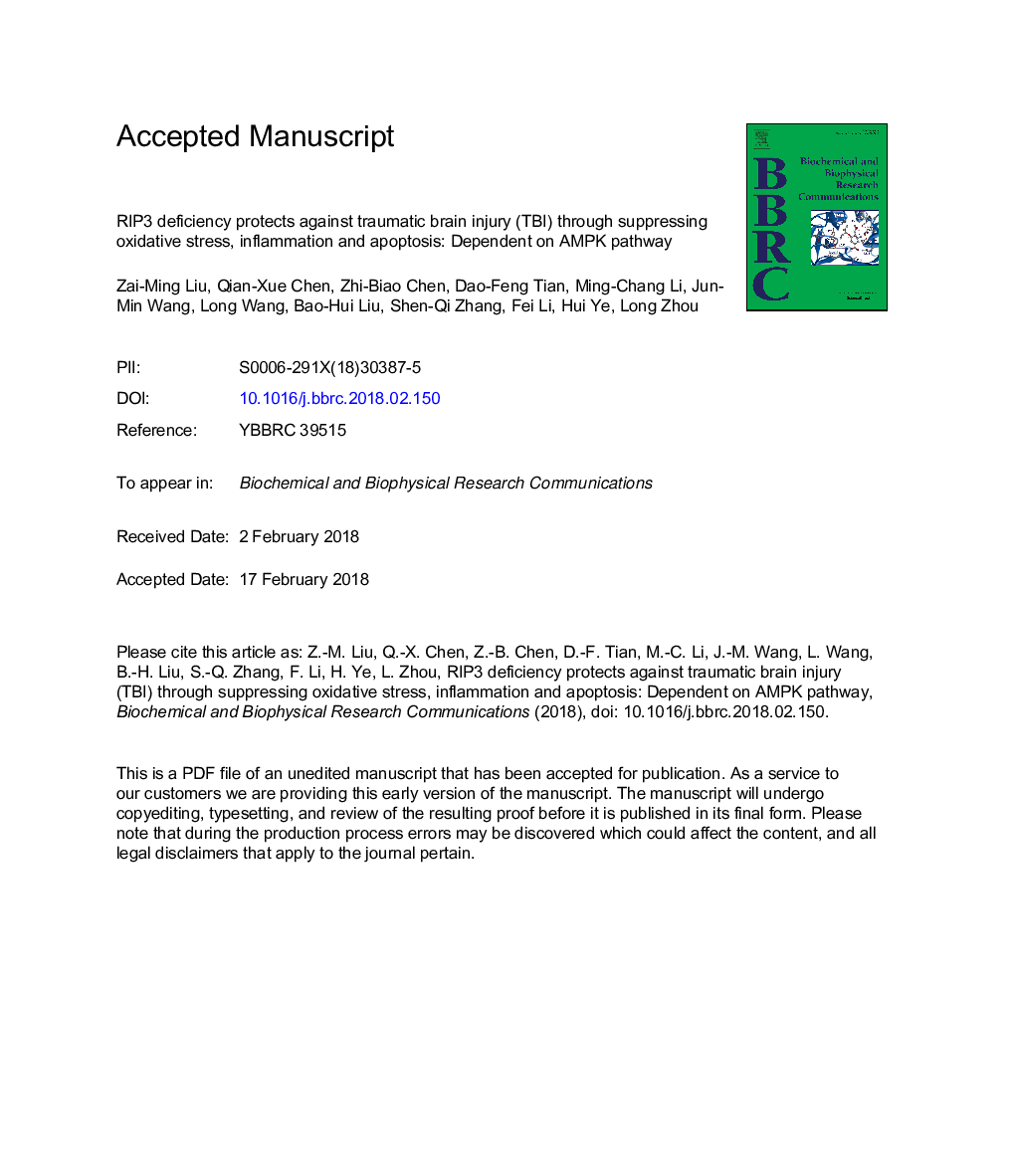| کد مقاله | کد نشریه | سال انتشار | مقاله انگلیسی | نسخه تمام متن |
|---|---|---|---|---|
| 8293075 | 1536742 | 2018 | 19 صفحه PDF | دانلود رایگان |
عنوان انگلیسی مقاله ISI
RIP3 deficiency protects against traumatic brain injury (TBI) through suppressing oxidative stress, inflammation and apoptosis: Dependent on AMPK pathway
دانلود مقاله + سفارش ترجمه
دانلود مقاله ISI انگلیسی
رایگان برای ایرانیان
کلمات کلیدی
موضوعات مرتبط
علوم زیستی و بیوفناوری
بیوشیمی، ژنتیک و زیست شناسی مولکولی
زیست شیمی
پیش نمایش صفحه اول مقاله

چکیده انگلیسی
Traumatic brain injury (TBI) is a leading cause of disability and mortality in young adults worldwide. The pathophysiology is not fully understood. Programmed necrosis (necroptosis) is a newly identified mechanism of cell death combining features of both apoptosis and necrosis. Receptor-interacting protein 3 (RIP3) plays an important role in programmed necrosis. However, the effect of RIP3-related pathway in TBI is little to be known. We attempted to explore the significance of RIP3 in regulating TBI in vivo. Significantly, TBI induced over-expression of RIP3 in the hippocampus of mice, as well as RIP1 and phosphorylated mixed lineage kinase domain-like protein (MLKL). Mice after TBI exhibited cognitive dysfunction and activation of glia cells, which were significantly attenuated by RIP3-knockout (KO). Moreover, inflammation and oxidative stress in hippocampus were markedly induced by TBI in wild type (WT) mice. Of note, the reduction of pro-inflammatory cytokines and oxidants was observed in RIP3-deficient mice, which was linked to the blockage of NLR pyrin domain containing 3 (NLRP3)/apoptosis-associated speck-like protein containing a CARD (ASC)/Caspase-1 and kelch-like ECH-associated protein 1 (Keap 1) pathways. Further, TBI induced hippocampus apoptosis, evidenced by the increase of cleaved Caspase-8/-3 and poly (ADP)-ribose polymerase (PARP) in WT mice, whereas being decreased by RIP3-knockout. In addition, RIP3 knockout led to phosphorylation of AMP-activated protein kinase α (AMPKα) in hippocampus of mice after TBI. And of note, the in vitro findings indicated that RIP3-ablation attenuated oxidative stress, inflammation and apoptosis in astrocytes, which was dependent on AMPKα activation. Together, suppressing RIP3 might be served as a therapeutic target against brain injury through inhibiting inflammation, oxidative stress and apoptosis.
ناشر
Database: Elsevier - ScienceDirect (ساینس دایرکت)
Journal: Biochemical and Biophysical Research Communications - Volume 499, Issue 2, 5 May 2018, Pages 112-119
Journal: Biochemical and Biophysical Research Communications - Volume 499, Issue 2, 5 May 2018, Pages 112-119
نویسندگان
Zai-Ming Liu, Qian-Xue Chen, Zhi-Biao Chen, Dao-Feng Tian, Ming-Chang Li, Jun-Min Wang, Long Wang, Bao-Hui Liu, Shen-Qi Zhang, Fei Li, Hui Ye, Long Zhou,